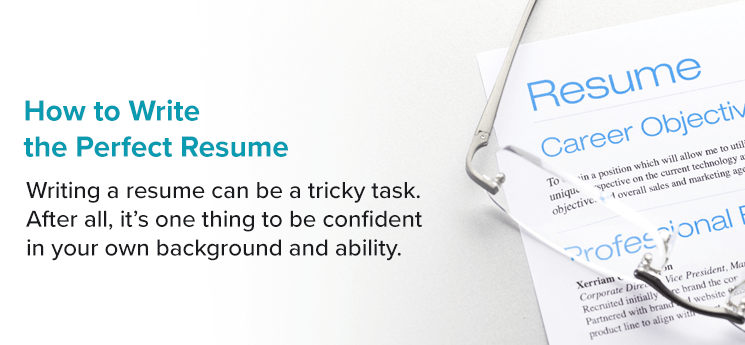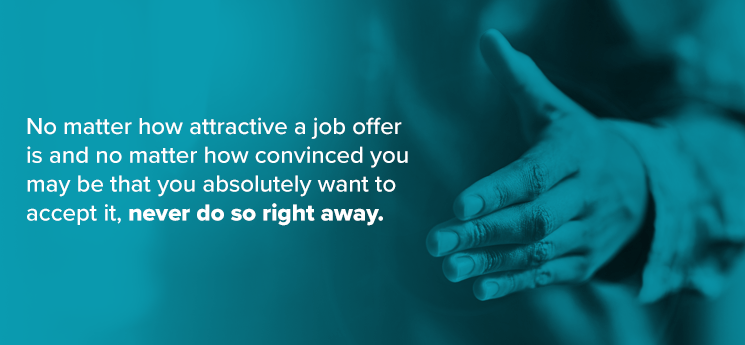By Derrek Cummings on May 3rd, 2019
After years of hard work, study and dedication, the big day has finally come. It’s graduation day, and just like that, you’re no longer a college student. Now, it’s time to move onto the next big thing — finding your first full-time job. This process is a challenge — we won’t lie about that. But it’s also an exciting challenge, filled with the chance to uncover new opportunities and chart an exciting course through life. There’s a whole world of possibilities out there for you to discover.
However, this change is still a big step, and it’s one that takes some skill to navigate. Great jobs don’t happen by accident, and finding the perfect job is the result of a go-getter attitude and the right type of planning. By teaching yourself how to be the best job candidate possible, you can make the difference between someone who’s struggling to land even one interview and someone who now has the luxury of choosing between multiple job offers.
Today, we want to help you navigate this process by compiling a list of the best tips for Harrisburg college graduates from schools like HACC, Messiah College, Dickinson College and Elizabethtown College. We’ll talk job boards, resumes and interviewing, teaching you how to navigate all these milestones and turn them to your best advantage.
Where Do You Find Jobs?
The first big question that any job seeker will ask is where to begin. Where do you find job postings? Where are people advertising for open job positions, and how do you track them down?
There are several different answers to this question, and rather than limiting yourself to one single source of job postings, we recommend using a mix of these sources. The most common ones that you’ll want to look into include:
1. Job Boards
The internet is full of job boards that are absolute goldmines for the job seeker. In today’s modern world, it’s a rare company that doesn’t list their open positions on at least one of the popular online job boards. As you’re hunting for jobs, type in keywords, job titles and locations, and let the search begin as you scroll through endless postings to find the one that’s perfect for you.
Most boards feature additional tools that let you filter positions by things like salary, required experience and previous education, allowing you to further tailor your results until you find the jobs you’re looking for.
Some of the top job boards that make excellent college graduate resources include:
- Indeed
- CareerBuilder
- GlassDoor
- Monster
Beyond these non-industry-specific job boards, you may also browse more specific websites that are targeted to include only jobs in your particular industry.
When browsing job boards, keep in mind that anyone can post on them, which doesn’t make the positions legitimate. Always do your homework to avoid falling into a scam. If you’re interested in applying for a job, take a moment to run a quick Google search first. If you can’t find a website or any mention of them anywhere, it might be best to skip that one.
It’s also a good idea to realize that some job postings are created automatically by companies and aren’t being monitored by hiring managers. You can usually pick these ones out by how sparse the listing is. If you suspect the job in question might be an automated posting, head to the company’s website instead, where you’ll likely find the true version.
2. Company Websites
If there’s a particular company that you know you’d like to work for, why not head directly to their website? Most companies, unless they’re extremely small, will have a section of their site dedicated to open positions. One of the best ways to find a job at your dream company is to periodically check this page, waiting for any open positions to pop up that might be a good fit for you.
Not quite sure where you want to work? Why not browse the websites of some of the nation’s top employers of recent college graduates, including:
- Amazon
- EY
- Oracle
- Lockheed Martin
- Insight Global
- IBM
- Vanguard
- Enterprise Holdings
- Deloitte
- Accenture
3. Career Fairs
Career fairs are excellent places to hear about companies that are hiring, as well as to form personal connections with these companies. These are events where many companies come together to advertise current openings and network with potential job candidates. As an attendee at one of these events, your job is to circulate throughout the room, be polite, friendly and professional and make good impressions on people. If you hear about a position or a company that sounds like an ideal fit, don’t be afraid to ask how you can apply.
For the most success at career fairs, always do your homework ahead of time. Research which companies are going to be there and learn a bit about them. Doing so will make you stand out from the competition and give you greater insight into who these companies are and whether you might be a good fit for each other.
Even if landing a job isn’t the direct outcome of your job fair experiences, these events can still be invaluable because of the personal and professional connections you’ll form there. Perhaps in the future, when a company has a new position open up, the hiring manager will remember you from the fair and decide you’d be perfect for the position. You never know what might come from that one conversation you struck up at a job fair.
How Do You Apply for Jobs?
So you’ve been browsing job boards, checking up on your dream company’s websites and hitting every job fair in your city. You’ve carefully built a list of jobs you want to apply for. What comes next? How do you ensure your application is as trim, precise and targeted as possible to land that all-important interview?
For most of us, this process starts by crafting the perfect cover letter.
1. How to Craft a Cover Letter That Works
Your resume is a place for you to list every qualification you have. Your cover letter, on the other hand, is the place to explain these experiences and tell your potential employers exactly how these past positions make you the very best candidate for the job at hand.
As you begin writing your cover letter, remember to keep it:
Short: Don’t write a novel with your cover letter. The people reading it are busy, and yours is just one in a giant stack of applications they’re sorting through. They do not have time to wade through a three-page cover letter, no matter how brilliantly written it is. Your letter should never be longer than one page, or it will be tossed out. Keep it to an average of four paragraphs, give or take, and you should be fine.
Relevant: Although your cover letter and resume will have some overlap, they’re different documents. The hiring managers don’t need you to simply list your qualifications, since you have a resume for that. Instead, your cover letter is where you explain which skills your past jobs have given you and how you can translate this experience into the position at hand. Let them know, in plain and simple terms, exactly why your career up to this point makes you the perfect candidate for this job, and leave out anything that distracts from this central message.
Specific: Always address your cover letter to the direct person rather than giving it a generic salutation such as, “To whom it may concern.” Research the company’s head of human resources or hiring manager, or find out who the head of your potential department is. This step may take some digging, but it’ll be worth it in the end. By including a specific greeting to an individual, you immediately set yourself above the other candidates as someone who cares enough about the job to research the person in charge of hiring for it
Tailored: Don’t use the same cover letter for every job you apply for. While the basic structure and much of the content may overlap, every position is different. As such, it’s your job to tailor your cover letter to each job posting. Employers will be able to tell if you’re using a stock cover letter with only the company name swapped out — or worse, a stock cover letter where you forgot to change the company name.
2. How to Write the Perfect Resume
Writing a resume can be a tricky task. After all, it’s one thing to be confident in your own background and ability. It’s quite another to find the perfect words to write it all down and present it in such a way that will convince a potential employer to be confident in you as well.
Writing a resume is especially tricky if you’re a recent graduate without a lot of experience to point back to. If you’re struggling with this exact problem, here are our best tips:
List the most recent and relevant work first: Employers are much more interested in your college internship than the job at the gas station from back in high school. While it’s important to list all work experience, especially if you’re trying to fill up space, always put the most important and relevant items first before working your way backwards. That way, the older positions will sit at the bottom of the page.
Be confident: Use punchy, attention-grabbing verbs through your resume. These words will make you sound more confident, self-assured and capable. Try to limit passive verbs like, “am, is, are, was, be and being.” For example, are you struggling with how to make your time as a cashier sound legitimate? Don’t just say that you “were a cashier.” Instead, try saying that you “elevated the customer experience through processing transactions, answering questions and positively representing the store’s brand.”
Avoid rambling: If you don’t have a lot of experience and thus don’t have a lot to say, there’s nothing wrong with keeping your resume short. While this document should be a full page, there’s no need to invent experience just to fill up space. Instead, try to make your font bigger, space out paragraphs and think of additional sections you could add, such as academic achievements, awards or special skills.
3. How to Ace Your Interview
If your resume and cover letter have caught the eye of employers, they’ll want to meet you to gauge whether or not you would be a good fit for the job. While anyone can write things that sound great on paper, meeting a person and talking with them often offers much more insight into what they’re truly like as a person. Interviews are an employer’s way of seeing who you really are and whether you’re right for the job.
For this reason, some people find interviews to be a bit nerve-wracking. With enough preparation, however, you can make the right impression and go a long way toward recommending yourself to an employer. Here are our tips for doing just that:
Do your homework: Research common interview questions before the big day arrives. While you can never be sure what the interviewer will or won’t ask you, there are many common questions that you can feel reasonably confident you’ll hear in some form or another. For example, you’ll like be asked, “Tell us about yourself” or “Describe your work ethic” or “Tell us about a time you had a problem at work and how you dealt with it.” Research these common questions ahead of time and come with answers prepared.
Dress the part: Appearance is an enormous part of your interview. Dressing professionally is more than just “the thing to do.” It also tells the interviewers that you’re taking this meeting seriously and that you care about the job at stake. Above all, it shows that you know how to present yourself well and look the part of the working professional.
Breathe: Take your time during the interview. Many of us become nervous under this type of pressure, leading us to ramble, talk faster than we usually would and even get out of breath, all of which compound to make us feel more jittery. Instead, try to breathe and take your time through interviews. While you don’t want to inject “um” and “uh” after every word, there’s also nothing wrong with taking your time and answering thoughtfully instead of plowing through every answer at a breakneck speed.
Stay confident: It’s easy to find yourself lost in the mindset of, “This person interviewing me will decide the fate of my career. They have years of experience and are so important, and I have to work so hard to impress them.” But try not to think this way. Instead, remind yourself that this is just a person doing their job. Odds are, they’re a little uncomfortable too. While you certainly should be professional and represent yourself well, it’s okay to relax a little and try to feel like you’re just having a conversation with another person.
How Do You Review a Job Offer?
If you’ve made it through the interview, congratulations are in order. No matter how much preparation you put into it, an interview will always be at least a bit stressful. It all becomes worth it, however, when you make it through the interview and come away with a shiny new job offer in hand.
The question is, what do you do next? Do you immediately jump for joy and accept it? Here are our best job offer review tips:
Never accept right away: No matter how attractive a job offer is and no matter how convinced you may be that you absolutely want to accept it, never do so right away. Instead, say thank you and ask if you can think about it for a day. The company may even preemptively suggest this action, as it’s the expected thing to do. This day or two is your time to review the offer carefully, consider your options and make sure you’re going into this job with both eyes open.
Look for key items: When you receive your job offer, be sure to read it over carefully. While you should familiarize yourself with everything it says, be especially sure to check for the salary agreement, any benefits you’re entitled to and the start date.
Be open to negotiation: Is the salary listed in your job offer letter a bit lower than what you think you deserve or need to make ends meet? Don’t be afraid to open a dialogue with your potential employer. While you might not be able to negotiate a $20,000 difference, you may be able to raise your salary by several thousand just by advocating for yourself and clearly expressing why you think your work will merit higher pay. Start date is another thing that you should feel free to negotiate if need be.
Once everything in your job offer looks good and you’re convinced that this is a good career move for you, it’s time to accept. Congratulations — your job search is complete!
Get Help Reviewing Your Job Offer Today
Still feeling anxious about a job offer letter? Worried there might be something nefarious buried in the confusing legal language? Here at Weisberg Cummings, P.C., we want to help you enter into job contracts with confidence and security. Contact us today to learn more about how we can put our years of legal experience to work for you by helping you review your job offer.






